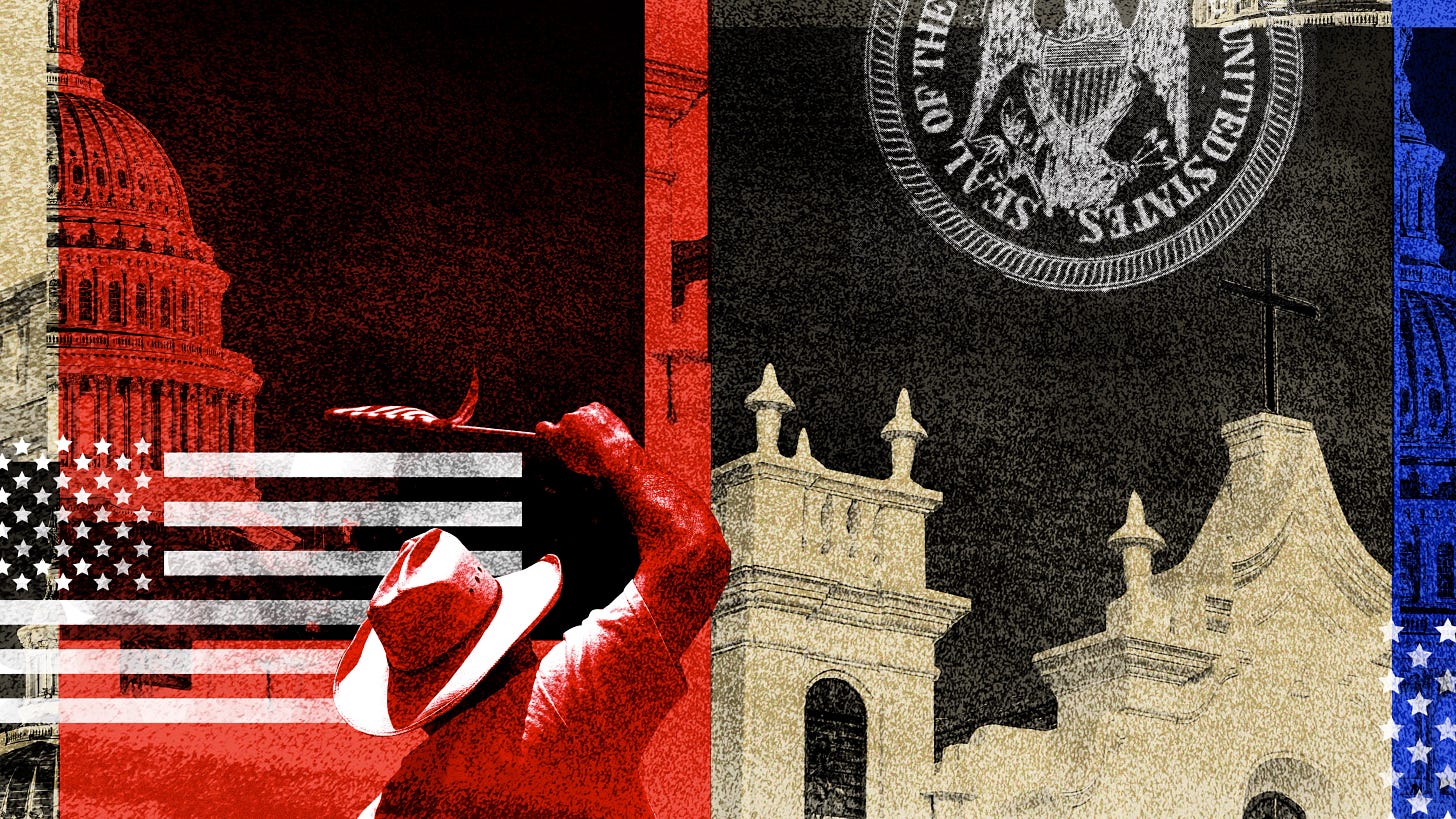Standing on the Promises
Christian Nationalism is a theological heresy that the church must address.
Christians who lived in Jerusalem faced persecution and hardship – the very things Jesus warns of in our scripture lesson – from the beginning of the Church’s existence. Throughout Paul’s letters, he asks Gentile Christian converts to pray for and support their siblings in Christ living in Jerusalem. It can be difficult for Christians living in the United States to imagine persecutions and trials detailed by Jesus: earthquakes, food shortages, epidemics, and harassment because of our faith in Jesus.
In the early 1990s, the New York Times published a detailed magazine article[i] highlighting the struggles of Egyptian Christians who were tortured for the same declaration we will make week after week – Jesus is Lord over all Creation.
More recently, the Washington Post told the story of a 61-year-old man arrested by the FSB in Pskov, Russia. The man was arrested for living a life committed to nonviolence, refusing military service, not voting, and “viewing God as the only true leader.” [ii] His crimes were considered “extremist activities.” What kind of extreme activities can a 61-year-old man engage in? My dad is 63, and getting a new book in the mail from Amazon is about as extreme as he gets.
This man’s punishment was 6 ½ years in prison.
I have always wondered if I would have the faith and trust in God necessary in this situation. I may seem tough and courageous, but I worry my courage would fall short given the tortuous conditions many Christians face worldwide. According to the CATO institute, last year, “Roughly 5,600 Christians were murdered, more than 6,000 were detained or imprisoned, and another 4,000-plus were kidnapped. In addition, more than 5,000 churches and other religious facilities were destroyed.”[iii]
Persecution – disenfranchisement, arrest, torture, and death – is what Christians around the world have experienced since the time of Jesus.
Then he said to them, “Nation will rise against nation, and kingdom against kingdom; 11 there will be great earthquakes, and in various places famines and plagues; and there will be dreadful portents and great signs from heaven.
12 “But before all this occurs, they will arrest you and persecute you; they will hand you over to synagogues and prisons, and you will be brought before kings and governors because of my name. 13 This will give you an opportunity to testify.
16 You will be betrayed even by parents and brothers, by relatives and friends; and they will put some of you to death. 17 You will be hated by all because of my name. 18 But not a hair of your head will perish. 19 By your endurance you will gain your souls.[iv]
With these words, Jesus is preparing his disciples for a time of testing. A time when the evil of our world will align against them, personally, as his followers and people of God. Our gospel lesson is not a feel-good metaphor or “what if” proposition. Jesus promises his disciples that days of darkness are ahead of them.
Jesus tells his disciples that following him will not be easy.
Christians living in the suburbs, safe within the confines of a mainline denomination, forget that Jesus tells his disciples that they will have to carry a cross to follow him. Discipleship, Jesus tells his followers, comes with a cost.

Evil, according to Jesus, is coming our way.
Evil at the hands of those who raise themselves above God, with an agenda that runs contrary to the Kingdom of God. At the hands of people like Herod, who built the very temple, Jesus said would come tumbling down. “The days will come when not one stone will be left upon another; all will be thrown down.”[v]
Apocalyptic talk within the church makes many of us in the mainline squirm in our pews or folding chairs. But the apocalyptic ideas of the New Testament make more sense today than they did for generations before World War II when the world faced down the cosmic battle between good and evil. When people like Corrie ten Boom, a Dutch Christian, successfully hid Jews in her tiny home before the Nazis came for them. Corrie ten Boom, along with her family, were sent to a Nazi camp for their actions, for their willingness to speak God’s word of hope in the face of evil.[vi]
Rev. Fleming Rutledge wrote, “Evil is more than the sum of individual misdeeds. Evil has a life of its own. It is not enough to stand aside from it. If it is not actively resisted, it sweeps all before it. Part of a Christian’s calling is to resist evil and, in doing so, endure to the end.”[vii]
The Apostle Paul detailed what creation faces, “For our struggle is not against enemies of blood and flesh, but against the rulers, against the authorities, against the cosmic powers of this present darkness, against the spiritual forces of evil in the heavenly places.”[viii]
Jesus tells us he will give us the words we need when trials and tribulations arrive. Through the power of the Holy Spirit, God’s Word Made Flesh is speaking a word of hope, courage, and grace to us in our times of suffering.
The rise of Nazi Germany brought apocalyptic theology back into the church, reminding us that no matter how hard we try to hide, evil will find us. As humanity has proven time and time again, we will, given the opportunity, put our trust in the Herod’s of the world over the grace of God
.
This rise of Christian Nationalism in the United States, especially within predominantly white churches, proves Paul, Fleming, and, more importantly, Jesus’ point. And we cannot ignore this rise, no matter how distant it seems from the safe confines of North Arlington. To be clear, the misguided grievances raised by Christian Nationalists are not persecution. Being told you cannot force children to pray in public schools or that a nation’s identity is more than religious propaganda and bad theology mixed is not religious persecution.
For the past two Wednesday evenings, a group from Mount Olivet has been immersing themselves in the work of Christian preacher and mystic Howard Thurman. This past Wednesday, Thurman had a word to speak to us. He wrote, “Sometimes we say that our personal load is so heavy that it is all we can do to look at ourselves, with all that that entails. Even as we express such ideas, we are reminded of a wide variety of events that we are never ourselves alone. We are not an island, we do not live alone.”[ix]
Turning a blind eye or assuming it will not affect us is the same as actively enabling Christian Nationalism to rise within the church in the United States.
Christian Nationalism attempts to use Jesus as cover its political agenda, using the message of Jesus for political propaganda and the church as the handmaiden and cheerleader of the state.
This is not a red or blue political issue. Christian Nationalism is a theological heresy that the church must address.
There will be trials and tribulations where the world around us is falling apart, and we are brought before the authorities to account for our “extremist activities,” and make no mistake, telling the story of Jesus’ lordship over the empire is an extremist activity. But the trials and tribulations faced by the Church may also require us to proclaim the grace of God. And Christian Nationalism is the exact opposite of the Good News announced in the Jordan River by John the Baptist, taught by Jesus, and proclaimed by the Church for centuries. Violence, exclusion, and hatred instead of mercy, compassion, and grace.
The Church has a word to speak in the face of rising Christian Nationalism and all the bigotry that comes with it. The One through whom all creation has been saved has a word for us.
Paul wrote to the church in Rome, facing down persecution themselves, “faith comes from what is heard, and what is heard comes through the word of Christ.”[x]

The church tells the story that evil does not get the last word.
The light of Jesus Christ shines brighter than any of the shiny distractions in Herod’s temple – 2000 years ago and today – because all creation is God's dwelling place.
Live with the knowledge that we have a word to speak today in the race of rising Christian Nationalism, and that word is that death, destruction, and evil do not hold the last word.
Jesus promises to set the world right.
Jesus promises that work has begun through his church, no matter how flawed or lost we become.
Christ is Lord. We are not.
He has come. And he will come again.
[i] https://www.nytimes.com/1993/03/15/world/muslims-fury-falls-on-egypt-s-christians.html
[ii] https://www.washingtonpost.com/opinions/global-opinions/christians-are-being-unjustly-imprisoned-where-is-bible-toting-trump/2020/06/12/529c8974-ab30-11ea-a9d9-a81c1a491c52_story.html
[iii] https://www.cato.org/commentary/christianity-worlds-most-persecuted-religion-confirms-new-report#:~:text=The%20group%20Open%20Doors%20USA,another%204%2C000%2Dplus%20were%20kidnapped.
[iv] Luke 21:10-13, 16-19
[v] Luke 21:6
[vi] Corrie ten Bloom. The Hiding Place. Baker Publishing Group. 2015.
[vii] Rutledge, Fleming. Advent: The Once and Future Coming of Jesus Christ. Eerdmans. 2018.
[viii] Ephesians 6:12
[ix] Thurman, Howard. Meditations of the Heart. Beacon Press. 1999.
[x] Romans 10:17





Your message is so extremely important and right.
Thank you .